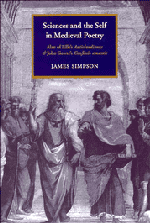 Sciences and the Self in Medieval Poetry
Sciences and the Self in Medieval Poetry Published online by Cambridge University Press: 15 December 2009
INTRODUCTION
In a fascinating aside to his exposition of the involucra of pagan philosophers in the Theologia Christiana (1122–7), Abelard registers a possible objection from his critics. He has argued that pagan philosophical fables are foreshadowings of Christian truth; so, he imagines, his detractors will accuse him of having distorted the real, historical sense of pagan integumenta in order to make them conform to Christian orthodoxy:
If, however, anyone should object that I am an unfit and destructive expositor, by arguing that I have twisted the words of the philosophers to agree with our faith by an exceedingly poor interpretation, and that I have imposed meanings on them which they did not intend at all…
Si quis autem me quasi importunum ac violentum expositorem causetur, eo quod nimis improba expositione ad fidem nostram verba philosphorum detorqueam et hoc eis imponam quod nequaquam ipsi senserint…
He goes on to answer the charge by saying that the philosophers spoke better than they knew, unknowingly inspired by the Holy Spirit. I relate this hermeneutic reflection here because I feel open to the same criticism as Abelard: just as he thinks that he might be accused of twisting the sense of the texts he interprets in order to make them conform to a present orthodoxy, so too, it could be argued, does my interpretation of the Anticlaudianus adjust the literal sense of the poem to make it square with an orthodoxy.
To save this book to your Kindle, first ensure [email protected] is added to your Approved Personal Document E-mail List under your Personal Document Settings on the Manage Your Content and Devices page of your Amazon account. Then enter the ‘name’ part of your Kindle email address below. Find out more about saving to your Kindle.
Note you can select to save to either the @free.kindle.com or @kindle.com variations. ‘@free.kindle.com’ emails are free but can only be saved to your device when it is connected to wi-fi. ‘@kindle.com’ emails can be delivered even when you are not connected to wi-fi, but note that service fees apply.
Find out more about the Kindle Personal Document Service.
To save content items to your account, please confirm that you agree to abide by our usage policies. If this is the first time you use this feature, you will be asked to authorise Cambridge Core to connect with your account. Find out more about saving content to Dropbox.
To save content items to your account, please confirm that you agree to abide by our usage policies. If this is the first time you use this feature, you will be asked to authorise Cambridge Core to connect with your account. Find out more about saving content to Google Drive.